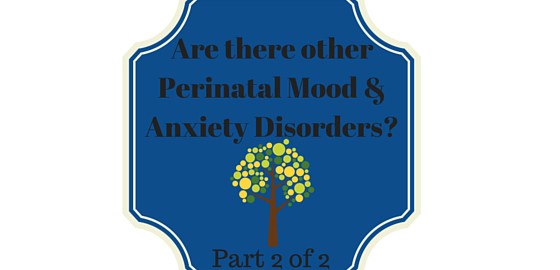Most people have heard about perinatal depression or anxiety, but there are additional mood and anxiety disorders that women can experience during pregnancy or in the postpartum period which you may not be as familiar with. This two part series is aimed at introducing you to some of the additional perinatal mood and anxiety disorders.
In part one of this series, I highlighted Perinatal Obsessive Compulsive Disorder (OCD) and Perinatal Post-Traumatic Stress Disorder (PTSD). This post (part t two of the series) focuses on Bipolar Mood Disorders and Postpartum Psychosis.
I will touch briefly on each of these disorders and encourage you to visit the Postpartum Support International website or consult with a mental health professional in your area for a more in depth understanding.
Bipolar Mood Disorders
- Those individuals who experience bi-polar mood disorders tend to experience two types of episodes; depression and mania.
- The Bipolar Mood Disorders are not limited to pregnant and postpartum women, but it is not uncommon for the symptoms to emerge for a woman for the first time during her pregnancy or the postpartum period.
- Symptoms of a depressive episode may include; feeling sad or anxious, hopelessness, loss of energy, loss of interest, sleep disturbance, change in appetite and thoughts of harming one’s self.
- Symptoms of a manic episode may include; high energy, impulsivity, little need for sleep, racing thoughts and irritability.
Postpartum Psychosis
- Rare, only occurs in only .1-.2% of births.
- Symptoms generally occur within the first two weeks postpartum.
- Symptoms include; delusions, hallucinations, irritability, hyperactivity, need for less sleep and mood swings
- Women who are experiencing postpartum psychosis should be seen immediately and assessed by a trained mental health provider. The delusions and hallucinations women with postpartum psychosis experience could place them at risk for harming themselves or others.
Both Bipolar Mood Disorders and Postpartum Psychosis are treatable with professional help. If you are concerned that you or a loved one are experiencing symptoms of one of the above disorders, I encourage you to consult with a mental health professional in order to get the support you need. Especially in the case of possible postpartum psychosis, it is important that immediate support is obtained. The Postpartum Support International website can be a great resource for finding support in your area.
Sarah
I am a licensed marriage and family therapist practicing in the Eagan, Minnesota area and have a special interest in working with parents. Please visit my Counseling for Parents page to learn more about the services that I offer.
